The Department
Mission: To research the languages of ancient Greek and Roman civilisations and the written documents and literary works produced in these languages, to reveal the social, intellectual and political developments of these societies and to share the results with the public.
Vision: To contribute to social development through these languages and cultures, which form the foundations of modern civilisation and played a role in the cultural history of Anatolia.
The origin of our department, which has been continuing its academic activities under the name of Ancient Greek Language and Literature since 1983, dates back to the second half of the 1930s as a sub-discipline of Classical Philology that combines Ancient Greek and Latin philology. Classical Philology was first occured at Istanbul University as an institute through the university reform of 1933 and it was converted into the Chair of Classical Philology in 1938. This was the second Chair of Classical Philology of Turkey, because the first one was founded at Ankara University in 1936. The first chairman of the Classical Philology at Istanbul University had been Prof. Dr. Clemens Bosch, and then Prof. Dr. Ronald Syme from Oxford University between the years 1942 and 1944. Only Latin began to be taught in the 1942-1943 academic year. However, Prof. Dr. Oliver Davies came from Ireland to take up the lectureship in Ancient Greek before the next academic year. Dr. George Ewart Bean, who came from Cambridge University in 1944, had taught both Greek and Latin until 1971. Prof. Dr. Zafer Taşlıklıoğlu, who graduated from the Chair of Classical Philology at Ankara University, came to our university in the same year to contribute to studies on Ancient Greek philology and raising students, and he served as the chairman of the Classical Philology from 1977 to 1983 as well. Our department, whose name changed to Ancient Languages and Cultures in 1983, consists of sub-departments named “Ancient Greek Language and Literature”, “Latin Language and Literature” and “Hittitology” since then. After this change Prof. Dr. Kenan Yonarsoy, one of the graduates of our department, was the first head of Ancient Greek Language and Literature from 1983 to 1999. Prof. Dr. Güler Çelgin, who also graduated from our department, undertook this office in 1999, and then the headship of the Department of Ancient Greek Language and Literature in 2010. After Prof. Dr. Çelgin's retirement in 2022, Assoc. Prof. Dr. Erman Gören was appointed as the Head of the department.
1. What does this field of knowledge aim for?
The program of Ancient Greek Language and Literature, representing one of the two disciplines that constitute “classical philology” as a fundamental field of study (the other being Latin Language and Literature), focuses on written texts in Ancient Greek. The subjects of these texts range from core sciences (Mathematics, Physics, Biology, etc.) to various literary genres (poetry, rhetoric, letters, tragedy, comedy, history, philosophy, etc.), and even primary sources providing historical data through inscriptions. Within the framework of this extensive corpus, the program of Ancient Greek Language and Literature is dedicated to evaluating and interpreting the information offered by the texts it examines, which extends to various aspects of antiquity.
2. What sets our programme apart from other programmes in Turkey?
Our program stands out, particularly among other Ancient Greek Language and Literature departments in Turkey, due to its emphasis on various literary genres (poetry, rhetoric, letters, tragedy, comedy, history, philosophy, etc.).
3. How can one enroll in the programme?
For the registration of the Ancient Greek Language and Literature Bachelor’s Programme in the YÖK Bachelor’s Atlas, click here.
4. What are the opportunities for double majors and minors offered by the programme?
For regulations on transitioning between associate and bachelor’s level programmes, double majors, minors, and inter-institutional credit transfers, click here.
5. What academic and social activities does the programme offer?
Our programme organizes an academic event titled “Logoi: Discussions on Antiquity” that is held three times per semester.
In addition, the Classical Philology Student Society (advisor: Assoc. Prof. Dr. Erman Gören), whose members are mostly students of Ancient Greek Language and Literature and Latin Language and Literature, hosts film screenings, city tours (modern/ancient) and student symposiums.
6. In what fields can graduates of this programme work?
Please click here for the areas of employment for our graduates.
